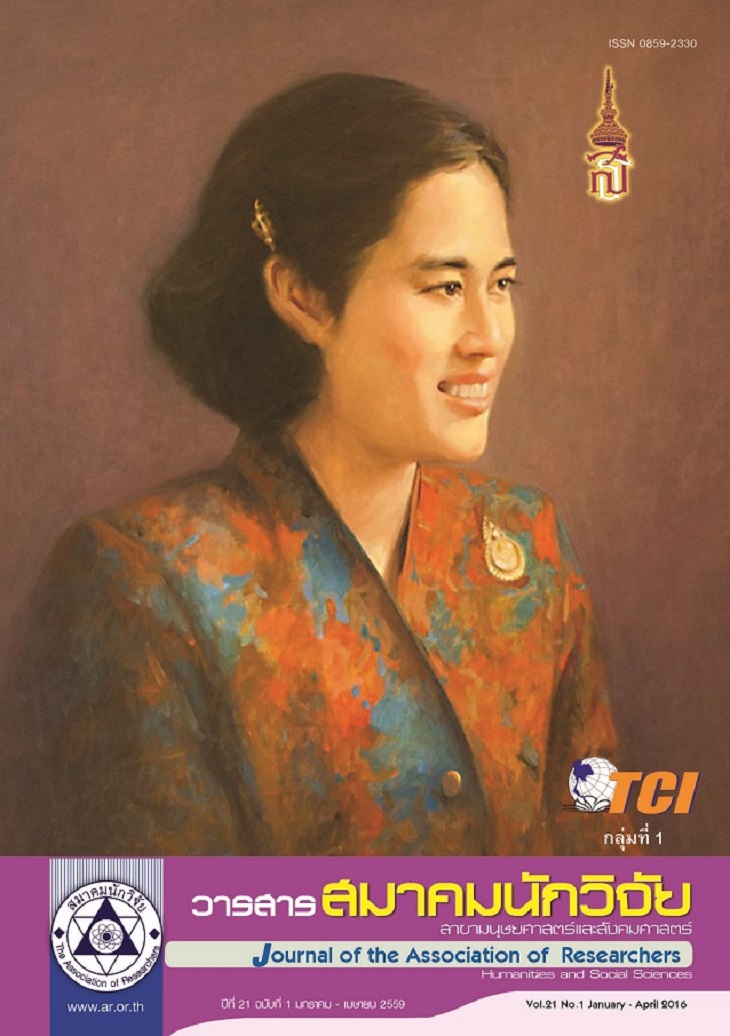Influences of Good Governance and Organizational Culture on Organizational Effectiveness of the Subdistrict Administrative Organizations in the Northern Region of Thailand.
Main Article Content
Abstract
The purposes of this research were 1) to study the average levels of good governance, organizational culture and organizational effectiveness of the subdistrict administrative organizations in the Northern region of Thailand, and 2) to study the influences of good governance and organizational culture on organizational effectiveness. The cross-sectional study design was conducted. The samples were 346 the subdistrict administrative organizations consisted of 1,352 in level of individual respondents.The results were as follows: 1) the average levels of good governance, organizational culture and organizational effectiveness were high. 2) There were statistically significant influences of both good governance and organization culture on organizational effectiveness. The 12.00 percent of the variance in organizational effectiveness was explained by good governance and organizational culture. The fit indices showed that the model fitted the data well; χ2 / df = 2.583, RMSEA = 0.063, CFI = 0.972 and NNFI = 0.960.
Article Details
บทความที่ปรากฏในวารสารนี้ เป็นความรับผิดชอบของผู้เขียน ซึ่งสมาคมนักวิจัยไม่จำเป็นต้องเห็นด้วยเสมอไป การนำเสนอผลงานวิจัยและบทความในวารสารนี้ไปเผยแพร่สามารถกระทำได้ โดยระบุแหล่งอ้างอิงจาก "วารสารสมาคมนักวิจัย"
References
ชูศักดิ์ เที่ยงตรง. (2518). การบริหารการปกครองท้องถิ่นของไทย. กรุงเทพฯ: มหาวิทยาลัยธรรมศาสตร์.
ถวิลวดี บุรีกุลและคณะ. (2545). โครงการศึกษาเพื่อพัฒนาดัชนีวัดผลการพัฒนาระบบบริหารจัดการที่ดี. นนทบุรี สถาบันพระปกเกล้า.
พรินทร์ เพ็งสุวรรณ. (2547). ธรรมาภิบาลกับประสิทธิภาพการบริหารงานของเทศบาล. วิทยานิพนธ์รัฐประศาสนศาสตร์มหาบัณฑิต สาขาวิชาศิลปศาสตร์ คณะรัฐประศาสนศาสตร์ มหาวิทยาลัยมหิดล.
รำพัน แสงมาลัย. (2552). การพัฒนากระบวนการบริหารงานสาธารณสุขตามหลักธรรมาภิบาลภายใต้ โครงการหลักประกันสุขภาพถ้วนหน้า อำเภอจังหาร จังหวัดร้อยเอ็ด. วิทยานิพนธ์สาธารณสุขศาสตร์มหาบัณฑิต สาขาวิชาการจัดการระบบสุขภาพ มหาวิทยาลัยมหาสารคาม.
ลิขิต ธีรเวคิน. (2525). การกระจายอำนาจและการมีส่วนร่วมในการพัฒนาชนบท. กรุงเทพฯ: สำนักพิมพ์มหาวิทยาลัยธรรมศาสตร์.
สุรศักดิ์ โตประสี. (2553). ธรรมาภิบาลในการบริหารงานคลังขององค์การบริหารส่วนตำบล. ดุษฎีนิพนธ์ปริญญาปรัชญา
ดุษฎีบัณฑิต สาขาวิชารัฐประศาสนศาสตร์ คณะรัฐศาสตร์ มหาวิทยาลัยรามคำแหง.
เสกสรร นิสัยกล้า. (2552). การนำนโยบายการบริหารกิจการบ้านเมืองที่ดี (ธรรมาภิบาล) ไปปฏิบัติ: กรณีศึกษา
กรุงเทพมหานคร. ดุษฎีนิพนธ์ปรัชญาดุษฎีบัณฑิต สาขาวิชารัฐประศาสนศาสตร์ คณะรัฐศาสตร์ มหาวิทยาลัยรามคำแหง.
สำนักงานคณะกรรมการพัฒนาระบบราชการ (2552). คู่มือการจัดระบบการกำกับดูแลองค์การภาครัฐตามหลักธรรมาภิบาลของการบริหารกิจการบ้านเมืองที่ดี (Good Governance Rating). กรุงเทพฯ: พรีเมียร์ โปร.
Becher, T. M. and Boerman, P. L. J. (1997). Decentralized Decision Making and Organizational Effectiveness in Colleges for Vocational Education: A Structural Equation Model for School Organization.Education Research and Evaluation 3(3): 189 – 213.
Clarke, V. C. B. (2001). In Search of Good Governance: Decentralization and Democracy in Ghana.Journal of Teacher Education. [Online]. Available from: /www.lib.umi.com/dissertation/fullcit/3023679 (2002, September 11).
Denison, D. R. (1990). Corporate Culture and Organizational Effectiveness. New York: Wiley.
Denison, D. R., Haaland, S. and Goelzer, P. (2003). Corporate Culture and Organizational Effectiveness:Is There a Similar Pattern around the World? Advances in Global Leadership. 3: 205-227.
Kimmet, P. (2005). The Politics of Good Governance in the ASEAN 4. Master Degree: Griffith University.
Kotter, J. P. and Heskett, J. L. (1992). Corporate Culture and Performance. New York: Free Press.
Quinn, R. E. and Rohrbaugh, J. (1983). A Spatial Model of Effectiveness Criteria: Towards a CompetingทValues Approach to Organizational Analysis. Journal of Management Science: 29, 363.
Scholz, C. (1987). Corporate Culture and Strategy - The Problem of Strategic Fit. Academy of Management Journal. 20 (4), 78 - 87.
Yamane, T. (1973). Statistics: An Introductory Analysis. 3rd ed. New York: Harper and Rows.


